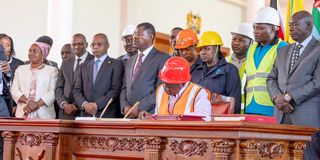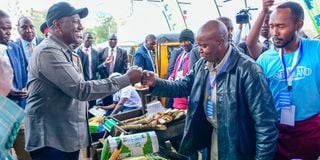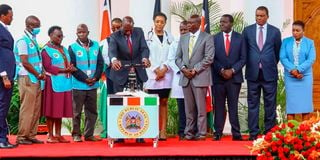
President William Ruto chairs a Cabinet Meeting.
It is a mixed bag of fulfilled and broken promises two years since President William Ruto rode to power on lofty promises of creating jobs for millions of unemployed youths and prioritising the needs of low-come earners.
Kenya Kwanza administration – which is smarting from the recent nationwide youth-led protests that forced the President to dissolve his Cabinet and bring on board opposition politicians – has been in major political turbulence linked to the rising cost of living and for reneging on some of the promises.
The administration, however, insists that it is still on the path to improve the living standards of the downtrodden through its Bottom-up economic model.
A document on the administration’s achievements prepared by the office of Deputy Chief of Staff, Performance and Delivery Management has listed major milestones in the housing project, provision of subsidized fertilisers, the hustler funds, provision of healthcare among other pet projects by Dr Ruto’s administration.

President William Ruto assents to the Affordable Housing Bill at State House, Nairobi in March 2024.
Nation sifted through the document vis-à-vis Kenya Kwanza manifesto and established some of the promises have been fulfilled, some ongoing while others have been broken or have stalled.
According to the document by the office under Mr Eliud Owalo, there has been a 1061 per cent increase in the number of Affordable Housing Units since Dr Ruto assumed office on September 13, 2022.
“The total number of affordable housing units under construction or already completed and launched across the country has increased from 8,872 in 2022 to 103,000 in 2024, an increase of 94,128 units.
The construction of the affordable housing units is currently ongoing in 40 counties with Nairobi leading with 33,810 units. Plans are underway to extend the units to all the 47 counties,” state the document.
In the manifesto, Dr Ruto told Kenyans that the requirement for new urban housing is estimated at 250,000 units per year, against a production of 50,000 units, translating to a deficit of 200,000 units.
“We will increase the supply of new housing to 250,000 p.a and the percentage of affordable housing supply from 2 per cent to 50 per cent. We will achieve this by structuring affordable long term housing finance schemes including a National Housing Fund and Cooperative Social Housing Schemes that will guarantee offtake of houses from developers,” states the manifesto.
Kenya Kwanza also promised to grow the number of mortgages from 30,000 to 1,000,000 by enabling low cost mortgages of Sh10,000 and below as well as strengthening Jua Kali industry capacity to produce high quality construction productions.
“The total number of jobs created in the affordable housing project has increased from 26,616 in 2022 to 140,610 in 2024, an increase of 113,994 jobs,” states the document.

President William Ruto signs the Finance Bill, 2023 to law at State House, Nairobi on June 26, 2023.
It also states that the total number of mortgages refinanced have increased from 2,522 in 2022 to 3,527 in 2024, an increase of 1,005 mortgages.
Under the fertilizer subsidy, the government said a total of 6.15 million farmers have since been registered to facilitate provision of low-cost farm input.
According to the data, since its launch in 2022, the number of fertilizer bags distributed to farmers has risen by 7.2 million bags from 1.4 million in 2022 to 8.6 million by 2024.
Further, the cost of a bag of fertilizer has decreased by Sh3,500 per bag from Sh6,000 in 2022 to Sh2,500 in 2014, representing a 58 per cent cost reduction.
“Maize production increased by 24 Million bags from 61.74 million bags in 2022 to 85.7 million in 2023, representing a 38.9 per cent rise in production of a 50Kg bag of maize.
Consequent to increased maize production, maize imports have decreased by 6 million bags from 17.8 Million in 2022 to 11.8 Million in 2023, resulting in a 33.7 per cent reduction in maize imports resulting in savings in foreign exchange,” states the government document.
The document states that the subsidy program has lowered flour shelf costs by an average Sh39.5, with the price of a 2kg packet of maize flour falling from an average of Sh169.9 in 2022 to Sh130.38 in 2024 representing a 23.3 per cent reduction.
The average wholesale price of maize per bag also dropped from Sh4,729 to Sh3,980, representing a 25.8 per cent reduction.
In the manifesto, Kenya Kwanza promised to transform two million poor farmers from food deficit to surplus producers through input finance and intensive agricultural extension support. The target was to generate a minimum productivity target of Sh50,000 revenue per acre.

President William Ruto chairs a Cabinet meeting at State House, Nairobi
“Raise productivity of key value food chains value chains (maize 8 -15bags/acre, dairy 2.5kg7.5kg per cow/day, beef carcass weight from 110kg - 150kg,” states the manifesto.
The government also indicated that it has distributed 556 metric tonnes of sunflower seeds to 34 counties, with further investment in seed multiplication and coconut cultivation.
This, it said, has resulted in an 8.3 per cent increase in the acreage under sunflower farming, from 60,000 acres in 2022 to 64,980 acres in 2024.
Further, the government has raised the guaranteed minimum price for milk from Sh37 in 2022 to Sh50 per liter in 2024, representing a 35 per cent increase. As a result, the government said, milk production has grown by 13 per cent, from 4.6 billion liters in 2022 to 5.2 billion liters in 2024 (New KCC),” it adds.
“In summary, these targeted interventions across key agricultural value chains have significantly enhanced productivity, reduced costs, and improved earnings for farmers. The ongoing efforts by the Kenya Kwanza Government are driving substantial socio-economic transformation, particularly for those at the base of the economic pyramid,” said Mr Owalo.
In 2022, the government commenced construction of 19 County Aggregation Industrial Parks countrywide. A recent spot check by Nation established all are incomplete. Some have also stalled because of budget cuts.
In 2022, the government launched the Hustler fund to provide affordable credit to Kenyans, especially those at the lower end of the economic pyramid in Kenya.
Data by the government shows that since its establishment, a total of 21.87 million individuals have so far joined and benefitted from the fund, which has disbursed Sh54.9 billion to applicants.

President William Ruto during the Launch of Hustler Fund at Green Park, Nairobi.
“Additionally, 673,340 groups have so far subscribed and are benefiting from the fund which has disbursed Ksh.185.8 million to them. The fund has helped the MSMEs and groups to save Sh9.3 million,” states the document.
But the same government on Monday said that more than half of the borrowers under the financial inclusion fund have defaulted on repayments totaling to Sh11 billion, while the non-performing loans ratio hits 21 per cent. This is according to the State Department for Micro, Small and Medium Enterprises (MSMEs).
In the manifesto, Kenya Kwanza said, “We will commit Sh50 billion a year to provide MSMEs with 100 per cent access to affordable finance through SACCOs, and venture capital, equity funds and long term debt for startups and growth oriented SMEs.”
In the health sector, the government has listed the establishment and operationalization of the Social Health Authority (SHA) to replace the National Health Insurance Fund (NHIF).
It also listed the establishment of an Emergency, Chronic and Critical Illness Cover whose benefits are accessible to all Kenyans, with beneficiaries entitled to emergency, chronic and critical cover upon depleting benefits under primary health care.
The government also highlighted an increase in the number of Level 4 Hospitals by 6 from 357 in 2022 to 363. The new Level 4 Hospitals are in Naro Moru, Ugenya, Keroka, Endebes, Kibugwa and Lusigetti.
Also in the list of achievement is the number of Level 5 and 6 Hospitals has increased by 2 from 13 in 2022 to 15 in 2024. The new Level 5 and 6 Hospitals are Kerugoya (Level 5) and Margaret Kenyatta (Level 6).
The number of registered nurses has also increased by 28,689 from 76,411 in 2022 to 105,100 in 2024, according to the government. Also increased is the number of registered clinical officers by 10,355 from 17,193 in 2022 to 27,548 in 2024.

President William Ruto affixes the public seal during the assent of the Universal Health Coverage Bills at State House, Nairobi on October 19, 2023.
The government further highlighted the increased number of Community Health Promoters (CHPs) receiving the Sh2,500 monthly stipend by 78,000 from 29,000 CHPs in 2022 to 107,000 CHPs in 2024.
“Community health is the bedrock of preventive healthcare. Doctors estimate that 70 percent of cases seen in our hospitals are preventable. It is estimated that one shilling invested in community health has a return of nine shillings saved in curative health costs.
"Kenya Kwanza is committed to ensuring that our primary health care has at the very bottom a well-resourced community health system. In this regard the Kenya Kwanza national government will contribute to the stipends paid to community health workers by county governments on a matching basis,” states Kenya Kwanza manifesto.
In the manifesto, Kenya Kwanza also promised to ‘fully publicly financed primary healthcare (preventive, promotive, outpatient & basic diagnostic services), that gives patients choice between public, faith based and private providers, based on a regulated tariff.’











